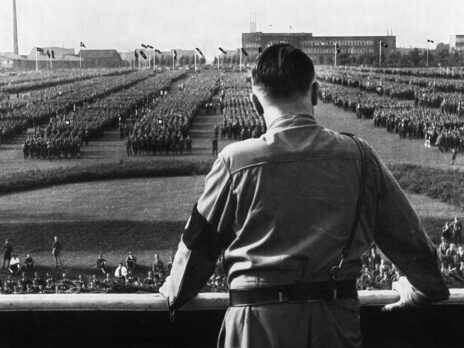
On or about May 1979, the British character changed. That, in a sentence, is the argument of Adam Curtis’s new documentary series Shifty. The election of Margaret Thatcher was the beginning of a revolution she helped accelerate but could never control, one involving economics, physics and ideology. Our nation – fretful, immiserated, lonely – was created in the two decades that followed.
The adjectives most often used to describe Curtis’s recent work tend to be related to drugs: hallucinatory, trance-like, psychedelic. They are apt. Though his earlier films featured interviews and televisual strictures, now he works through a combination of montage and caption, ditching even the nasal narration that once characterised his work. Some storylines he pursues for a full episode, others receive a mere 30 seconds of fame. The effect is disorientating, a constant swaying between plot and subplot. But sudden contrast is Curtis’s fetish: gentlemen in cricket whites beneath skeletal electric pylons; shots of glass-and-steel towers immediately followed by a horse dying in a field.
However, despite this reputation for experimentation, you get the sense that the scenes he is most drawn to are sober, humdrum, everyday. So, while you have Thatcher scuttling about laying tables for state banquets and trying to force monetarism to work, you also get nightclubs, barbers and police interviews – all the inventory of history from below. Sometimes you wonder where such moving footage comes from: who was letting documentarians into their house parties in 1981? But no matter. Such is the capaciousness of the BBC’s archive that serves as Curtis’s quarry, he doesn’t have to show or tell you. You simply see.
When he’s doing history from above, though, Curtis is, by his own standards, dealing with a conventional arc. We move in a familiar sequence from Thatcher to Big Bang, from deindustrialisation to MDMA, from mass politics to mass atomisation. Perhaps it is a sign of the shifting historiography of the recent past that this feels more like restatement than reinterpretation. Thatcher is no longer seen as Britain’s saviour on the right or left. We all know the bankers are crooked and the politicians are powerless. And did anyone else hear that Max Clifford was a wrong ’un?
However, these familiarities are diversified by much more Curtis-like swerves into the strange and the eccentric. Like the story of Stephen Knight, a local reporter who became a national figure for claiming in his book Jack the Ripper: The Final Solution that the Victorian murders were linked to both the Freemasonry movement and the British royal family. Knight went on to write another conspiratorial book about the Freemasons before his early death from a brain tumour. Though Knight is scarcely remembered today, for Curtis he is illustrative of a paranoid society growing fearful and sceptical of its elites.
The title of this series (“shifty”) is a description of what happens “in societies when the foundations of power begin to move”. It’s something we all feel – almost to the point that you wonder if it is truly confined to the last two decades of the 20th century in Britain. The Sixties and Seventies – with their own depressive introspection, aristocratic crack-up, and stewing industrial conflict – could surely have served as part of the same canvas. At times Curtis overstretches himself, conflating the late-20th century with modernity in the broadest terms. Aside from Mrs Thatcher, Curtis’s main protagonist is probably Stephen Hawking, whose hyper-rational analysis of the cosmos Curtis places in parallel with the penetration of market forces into the soul of Britain. It is difficult to see these phenomena as coterminous. At other moments, his captions are slightly strident, almost drunkenly so: “The concept of privatisation had been invented by the Nazis.”
“Do you really believe that, sir, or are you just trying to make us think?” So Dakin asks his teacher Irwin in Alan Bennett’s The History Boys as he hears the mythos of the First World War being swept away. I would ask Curtis the same question. But in Bennett’s play, the boys learn that sincerity and iconoclasm are both necessary instincts. As a rare historian who is willing to prioritise sweep, argument and craft over the accumulation of credible detail, we are fortunate to have Adam Curtis.
Shifty
BBC iPlayer
[See also: Amol Rajan’s Ganges vanity project]
This article appears in the 02 Jul 2025 issue of the New Statesman, Just Raise Tax!





